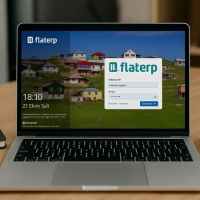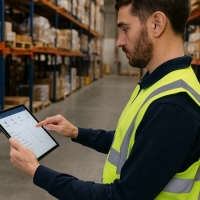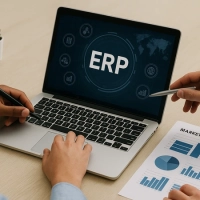
- What is Cloud ERP and Why Has It Become So Popular?
- The Most Common Security Risks in Cloud ERP Systems
- Flaterp Cloud ERP's Security Approach
- Backup, Monitoring and Continuous Update
- Additional Security Measures Businesses Can Take
- Misconceptions About Cloud ERP Security
- KVKK and Legal Compliance
- True Trust is More Than Technology
What is Cloud ERP and Why Has It Become So Popular?
ERP (Enterprise Resource Planning) systems gather processes such as accounting, sales, inventory, production, human resources and project management in your business under one roof.
Cloud ERP allows you to manage this system via a secure cloud infrastructure instead of physical servers.
Thanks to modern ERP solutions like Flaterp, businesses no longer need to install servers, incur high maintenance costs, or perform complex updates. Cloud ERP's ubiquitous access , real-time data sharing , and automatic backup features increase efficiency and ensure business continuity. However, these benefits are only meaningful with a robust security infrastructure.
The Most Common Security Risks in Cloud ERP Systems
Data security is one of the most sensitive areas for cloud ERP solutions.
The threats that businesses are most concerned about generally fall into the following categories:
Unauthorized access
Weak password policies or incorrect authorizations can allow attackers to infiltrate the system.
Flaterp uses multi-layered user authentication and role-based access control to ensure each user only performs actions within their authority. This eliminates the risk of unnecessary access to the system.
Data leak
The most feared scenario for many companies is the leak of confidential customer or accounting data.
Flaterp minimizes this risk with AES-256 bit encryption technology. All data traffic is encrypted both in transit and at rest.
In this way, your data becomes unreadable by unauthorized persons.
Ransomware and malware attacks
Ransomware-type attacks have become a serious threat in recent years. In these attacks, your data is encrypted and rendered inaccessible.
Flaterp builds its system on an isolated server architecture, preventing potential attacks from spreading. Regular automatic backups allow for quick data restoration in the event of an incident.
Human error
No matter how robust a system is, human errors can pose significant risks. Incorrect file sharing, weak passwords, or unknowingly downloading malicious files can have serious consequences.
To protect its users in this regard, Flaterp enforces strong password policies within the system and provides access control reports to administrators. Additionally, the Flaterp team minimizes errors by providing regular data security awareness training to its users.
Flaterp Cloud ERP's Security Approach

Flaterp treats data security not just as a technical detail, but as the fundamental building block of the software.
Every layer of the system is designed to protect against potential threats.
Data is stored on secure servers. Flaterp has backups against physical threats such as earthquakes, fires, and power outages.
Servers are monitored 24/7, and intrusion detection systems (IDS/IPS) are actively operating. Furthermore, all connections are protected by SSL certificates.
Flaterp uses OTP (one-time password) authentication for user logins, and every access action is recorded in the audit log system. This allows administrators to always see who did what on the system.
Backup, Monitoring and Continuous Update
Data security is not only about preventing attacks; rapid recovery in case of any possible situation is also vital.
Flaterp automatically backs up all your data daily and stores these backups on secure servers in geographically diverse locations. This way, in the event of a system failure or attack, you can regain access to your data within minutes. Additionally, Flaterp proactively identifies system vulnerabilities through regular penetration testing . New security patches are tested in a test environment and distributed to users after approval.
This approach ensures that Flaterp's systems always remain up-to-date, fast and protected .
Additional Security Measures Businesses Can Take
Although Flaterp offers a strong infrastructure, businesses should also take some precautions on their own side to reinforce security.
Using strong passwords, activating multi-factor authentication (MFA), regularly reviewing user permissions, and providing security training to employees are among the top steps.
Flaterp users can easily implement these steps using the security tools offered by the system.
For example, when an employee changes duties, it is possible to update access permissions within seconds and keep data sharing under control.
In this way , a two-way security shield is created at both technical and operational levels.
Misconceptions About Cloud ERP Security
Many businesses are biased against cloud systems.
The notion that “cloud systems are insecure” is still prevalent, when in fact it is quite the opposite.
A properly configured cloud infrastructure is generally much more secure than on-premises systems because it is constantly monitored and updated by expert teams.
Another misconception is that "data is mixed with other companies."
Flaterp stores each customer's data on logically isolated servers, so no data is mixed with other companies' systems.
The worry that “if there is an attack, all data will be lost” is no longer valid.
Flaterp's multi-layered backup system protects your data in different regions, both physically and digitally.
KVKK and Legal Compliance
Data security is not only a technical imperative, but also a legal requirement.
Flaterp Cloud ERP is fully compliant with KVKK and data hosting legislation .
In this way, you can store your business's customer and employee data in accordance with legal requirements in Türkiye.
Additionally, Flaterp's e-invoice, e-archive and e-ledger modules also work with a secure integration infrastructure.
True Trust is More Than Technology
Data security is ensured not only with strong encryption systems but also with a holistic approach.
Flaterp embraces this approach and evaluates technology, processes and user awareness within the same framework.
Every day, dozens of businesses work without fear of losing their data thanks to Flaterp's secure cloud infrastructure.
If you want to see how secure your data really is, you can examine the Cloud ERP solutions offered by Flaterp and start your secure digital transformation journey today.
























